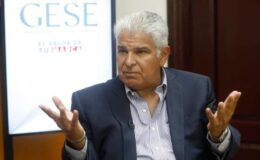“La Estrella ” Editorial sheds a better than PNO light on Democratic challenges in Panama.
- By : James Bryson
- Category : Editorial Contribution, Politics

Let’s let the others chime in and see what they say,
The current electoral regime began in 1978, during the military dictatorship. Its purpose was to create a party system with a dominant party – in the style of the Mexican PRI – to make people believe that a partisan democracy existed in Panama.
The party system would be dominated by the PRD. The other groups would operate as satellites, to which the crumbs of the cake would be thrown as long as they followed the rules of the game.
The dictatorship’s electoral regime has been patched several times since 1978 but its fundamental features, which favor the PRD, have not changed. Consequently, since its founding in 1979 – 45 years ago – the PRD has remained the dominant party in Panama.
His dominance is not due to receiving an absolute majority of votes in popular elections. It obeys a biased, undemocratic and fraudulent electoral system, which has placed the municipal councils, the district governments, the National Assembly and the Executive Branch under the preponderance of the PRD.
A simple analysis of the electoral figures leads unequivocally to this conclusion. Since the transition to democracy, we have had six general elections: in 1994, 1999, 2004, 2009, 2014 and 2019.
Each time there have been four elections: for president, deputies, mayors and representatives. In total: 24 elections since May 1994.
The average of the vote received by the PRD on those 24 occasions is 32%. In other words, if we add the percentage of votes received by the PRD in each one and divide it by 24, the PRD has received, on average, just under a third of the voters’ sympathies.
That third has served to control the executive in three periods (1994-1999; 2004-2009 and 2019-2024), as well as to dominate the National Assembly, monopolize the largest number of mayoralties and obtain the largest number of township representatives, with their respective budgets, exponentially enlarged in times of decentralization.
Let’s focus on the 2019 elections to get a more precise idea of the undemocratic nature of the electoral system. That year, with 31% of the presidential vote, added to the 2% that Molirena contributed, the PRD obtained control of the national executive.
This would not be so serious if functional control organizations operated in Panama, as exists in other democracies, with the capacity to stop the arbitrariness of the executive. The dysfunctionality of the Panamanian State, however, means that the votes of a third of the voters provide carte blanche for the executive to abuse, for five years, without any consequences, the power that is constitutionally conferred on it.
But it’s not just presidential elections that are undemocratic. With 30% of the vote for deputies throughout the country, in 2019 the PRD obtained 37 of the 71 seats in the National Assembly, which represents 52% of the chamber.
In other words, the corrupt system of election for deputies allowed the PRD to obtain 16 more seats than it would have obtained with a truly democratic and proportional electoral system (30% x 71 = 21; 37 – 21 = 16).
This corrupt system, sponsored and endorsed by the Electoral Tribunal, includes informal aspects, such as vote buying, manipulation and cheating, and formal aspects, such as the grotesque formula for the distribution of seats in multi-member circuits (including the disastrous “residue “).
These are not the only distortions that undermine democracy in Panama. In 2019, the PRD received 32% of the vote for older people nationwide. That minority 32% helped him obtain 38 of 81 mayorships, which is equivalent to 47% of municipal executives.
The results in the elections for representatives and councilors are a replica. The 31% of votes that the PRD obtained in that vote helped it obtain 322 of the total of 688 representatives and councilors elected in 2019, which is equivalent to 47% of those positions.
In 2019, as throughout the so-called “democratic period”, the PRD, despite having obtained a minority vote, has obtained a disproportionate majority of popularly elected positions. The reason behind its success is not its reputation or its transparency, honesty, effectiveness, responsiveness to national problems, patriotism or defense of sovereignty.
The reason is an electoral system whose foundations were laid in 1978, during the military dictatorship, to favor the ruling party that would soon be created and whose predominance they wanted to ensure eternally.
The main feature of the election system is the predominance of single-member constitutions without a second round of elections. Let’s go back to 2019 to better understand the situation.
That year, 841 main positions were elected by direct popular vote. Of the total, 796 were elected in single-member constituencies: 1 president of the republic, 26 deputies, 81 mayors and 688 representatives and councilors.
Only 45 deputies were elected in multi-member circuits through a supposed system of proportional representation. But, even in the few spaces of supposedly proportional allocation, the perverted residue formula distorts the popular will.
In other words, of the 841 elected positions, 95% were elected in single-member constitutions without second rounds.
Who has the best chance of winning in a multiparty election held in single-member districts? Nothing less than the party that enjoys the support of a third of the voting public; It has enormous resources – public and private, legal and illegal – to finance political campaigns; He has extensive experience in electoral fraud and dictatorships (as his own president recently said); and controls an enormous state bureaucracy of 275,000 public employees, and, therefore, the public force and the Electoral Court.
It will be up to the next government, inevitably, to democratize the electoral system, discarding the criteria generated during the military dictatorship. The collegiate bodies must be elected according to the strictly proportional system, in a single national circuit for the Assembly and in municipal circuits for the councils.
For all executive positions – president and mayors – the second round must be introduced, without exceptions. Furthermore, it is urgent to democratize the Electoral Code and restructure the Electoral Court. Only in this way can the undemocratic distortions of the Panamanian election system be corrected.



No Comments